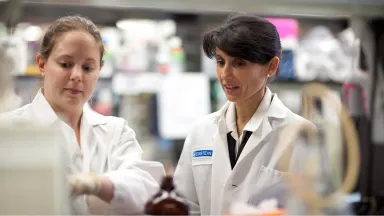
Mohammad Asad, Ph.D.
Area of research
- Tumor immune evasion and checkpoint inhibitor resistance; Glioblastoma immunology and extracellular vesicle-mediated signaling; Myeloid cell reprogramming in cancer microenvironments; Translational immunotherapy and neuro-oncology
Phone
Location
- Albert Einstein College of Medicine Rose F. Kennedy Center 1410 Pelham Parkway South 530 Bronx, NY 10461
Research Profiles
Professional Interests
Dr. Asad's Research on Glioblastoma Immunosuppression
Dr. Asad's research focuses on glioblastoma (GBM), the most aggressive type of brain tumor. The aim is to understand the mechanisms in the tumor microenvironment (TME) that contribute to immunosuppression, leading to more effective therapies.
Key areas of investigation include immunosuppressive monocytes and myeloid-derived suppressor cells (MDSCs), which hinder the immune response by reducing the effectiveness of innate and adaptive immune cells. Understanding these cells is crucial for developing targeted treatments.
The research also explores tumor-derived extracellular vesicles (EVs) and other soluble mediators that suppress immune responses, to restore immune function. Various models are used, including human and animal studies, ex vivo and 3D systems, patient-derived tumor samples, and immunocompetent murine glioma models.
Identifying the key factors contributing to the immunosuppressive environment will guide the development of targeted therapies designed to reinstate immune function and enhance treatment efficacy. This work also seeks to uncover potential therapeutic targets to disrupt these immunosuppressive mechanisms, ultimately improving patient outcomes. Furthermore, the research aims to provide valuable insights into the complex interactions between tumor cells and the immune system, contributing to the broader field of brain tumor research.
Selected Publications
- Asad M et al. TIGIT expression dictates immunosuppressive reprogramming of myeloid cells in glioblastoma, BioRxiv (2025).
First demonstration of tumor extracellular vesicle-driven TIGIT's direct role in reprogramming tumor-associated myeloid cells, opening therapeutic avenues against glioblastoma-induced immune suppression.
- Inocencio JF, Asad M et al. Immune Checkpoint Pathways in Glioblastoma: A Diverse and Evolving Landscape, Front Immunol (2024).
Comprehensive review of immune checkpoint evolution in glioblastoma, highlighting future translational targets.
- Jerschow E, Asad M et al. Aspirin-exacerbated respiratory disease linked to epithelial barrier gene variants, J Allergy Clin Immunol: Globe (2024).
Unveiled new genetic factors in airway epithelial barrier dysfunction in AERD, proposing novel biomarkers.
- Shilts M, Asad M et al. Severe COVID-19 correlates with altered upper respiratory microbiome, Front Cell Infect Microbiol (2022).
Pioneering evidence linking microbiome dysbiosis with COVID-19 severity.
- Asad M et al. IL-35 and TGF-β regulate Th17 effector functions in visceral leishmaniasis, FASEB J (2021).
First report demonstrating synergistic regulation of Th17 pathogenicity by IL-35/TGF-β axis in parasitic infection.
- Andiappan AK, Asad M, et al. Neutrophilic inflammation and epithelial barrier disruption in nasal polyps characterize NSAID-exacerbated respiratory disease. Allergy (2021).
This study demonstrates that neutrophilic inflammation and epithelial barrier disruption are defining features of nasal polyps in allergic asthma.
- Sehanobish E, Asad M et al. New Concepts in AERD Pathogenesis, Curr Opin Allergy Clin Immunol (2021).
Proposed updated model of cellular interactions and therapeutic interventions in AERD.
- Das S, Asad M et al. Chemical inhibitor of HSP78: A potential anti-leishmanial agent, J Biol Chem (2020).
Identified a novel molecular target for parasitic chemotherapy.
- De M, Ghosh S, Asad M et al. Combining doxorubicin with stearylamine-bearing liposomes elicits Th1 cytokine responses and cures metastasis in a mouse model. Cancer Immunol Immunother (2020).
Demonstrated stearylamine-bearing liposomal formulation of doxorubicin cures solid tumor via eliciting strong both Th1-type and innate immune response for host anti-tumor immunity.
- Asad M, et al. EB1-3 chain of IL-35, along with TGF-β synergistically regulates anti-leishmanial immunity. Front Immunol (2019).
First report demonstrating IL-35-mediated Tregs as a crucial factor for inhibiting host anti-leishmanial immunity.
- Das A, Asad M et al. Monophosphoryl Lipid A Based Cationic Liposome Facilitates Vaccine Induced Expansion of Polyfunctional T Cell Immune Responses against Visceral Leishmaniasis. ACS Appl Bio Mater (2018).
Established a novel cationic liposome as a potent immunostimulatory delivery system for DNA-based vaccine, deciphering strong therapeutic and prophylactic effects against leishmaniasis. This approach holds promise not only for combating leishmaniasis but also for other infectious diseases.
- Asad M, et al. Therapeutic and immunomodulatory activities of short-course treatment of murine visceral leishmaniasis with KALSOME(TM)10, a new liposomal amphotericin B. BMC Infect Dis (2015).
Proposed a new liposomal formulation of amphotericin B as the most effective and promising anti-leishmanial drug.





